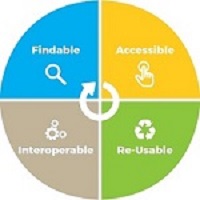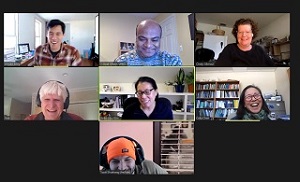Science Leadership
SRP staff and grantees are committed to advancing research by presenting innovative findings, tools, and technologies to stakeholders in academia, government, and communities.
SRP provided supplemental funding to Centers to expand the focus of their research to address critical knowledge gaps related to exposure to the SARS-CoV-2 virus and its disease, COVID-19. Another type of funding mechanism, part of the NIH's Rapid Acceleration of Diagnosis for Underserved Populations (RADx-Up) Initiative , was made available to encourage researchers to develop and implement technologies for COVID-19 testing in underserved populations. These projects provided grantees the opportunity to leverage their SRP Center infrastructure to pivot their research to contribute to the national response to public health emergencies.
SRP Health Scientist Administrator Heather Henry, Ph.D. is working closely with the Federal Remediation Roundtable (FRTR) to develop their strategic plan. FRTR brings together federal agencies involved in hazardous waste site cleanup, including U.S. Department of Defense, U.S. Department of Energy, U.S. Environmental Protection Agency, U.S. Nuclear Regulatory Commission, and NIEHS, to share information, learn about new technologies, and discuss future directions.
Henry chaired a session at the NIEHS virtual meeting on the Impact of Environmental Exposures on the Microbiome and Human Health February 23 - 24. The meeting also featured many SRP grantees who shared their innovative research in platform presentations and lightning talks.

SRP Health Specialist Sara Amolegbe, M.S.P.H., and Henry hosted the Virtual Technology Fair as a satellite workshop to the 2020 SRP Annual Meeting. This event featured innovative environmental remediation and monitoring tools being developed by NIEHS-funded small business grantees . A YouTube video playlist of the technology fair is now available for viewing.
SRP Health Scientist Administrator Michelle Heacock, Ph.D., and Health Specialist Brittany Trottier, M.P.H., provided a Data Science and Sharing Mini-Workshop during the 2020 SRP Annual Meeting for researchers involved in SRP Data Supplements . The event focused on fostering collaboration and facilitating a community of practice to enhance data management and sharing among SRP scientists and staff.

Heacock hosted the SRP data supplement External Use Case (EUC) report-out meeting in February where teams came together to discuss advances made towards sharing and integrating SRP datasets. Participants shared lessons learned and recommendations for making data more findable, accessible, interoperable, and reusable (FAIR) from the types of data streams represented in each EUC.
SRP partnered with Health Scientist Administrator Lindsey Martin, Ph.D., of the NIEHS Population Health Branch (PHB) during the last Research Translation Core webinar to discuss implementation science as a new area of focus within NIEHS. Martin introduced implementation science approaches and theories and how they may be useful in achieving the objectives of SRP's 2020 Strategic Plan (2MB) , including promoting stakeholder engagement and for prevention and intervention activities.
Research led by Milton Gordon, Ph.D., and Lee Newman, Ph.D., of the Washington University SRP Center was highlighted in the latest SRP Public Health Impact story . The story explains how their early work, along with that of Stuart Strand, Ph.D., and Sharon Doty, Ph.D., revolutionized the use of poplar trees to clean up trichloroethylene.
Associate Director of the University of Arizona SRP Center Donna Zhang, Ph.D., was featured in an NIEHS Grantee Story of Success . The story highlight's Zhang's research understanding the interaction between a protein called nuclear factor erythroid 2-related factor 2 and arsenic exposure, and how it contributes to the development of human disease.
to Top



